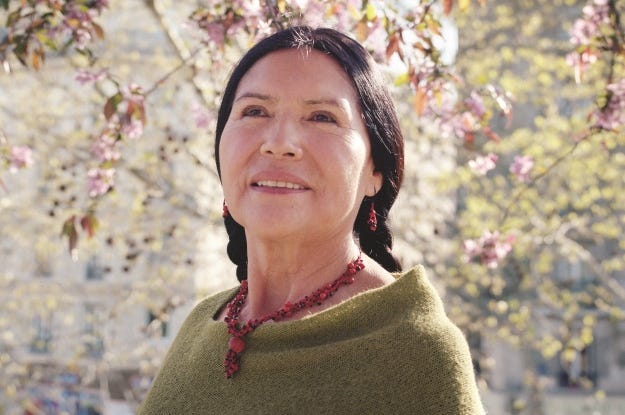Monday Messages
An archival Luzmila Carpio interview + some reading and watching recommendations
Selected Works is a weekly (usually) newsletter by the Te Whanganui-a-Tara, Aotearoa (Wellington, New Zealand) based freelance music journalist, broadcaster, copywriter and sometimes DJ Martyn Pepperell, aka Yours Truly. Most weeks, Selected Works consists of a recap of what I’ve been doing lately and some of what I’ve been listening to and reading, paired with film photographs I’ve taken + some bonuses. All of that said, sometimes it takes completely different forms.
WHAT I’VE BEEN DOING:
On Friday, I recapped a few different releases I’ve been enjoying lately for the UK-based Balearic music specialists, Test Pressing. You can read the full column over here. Expect records from Ferkat Al Ard, Picture Music, NTS, and James Alexander Bright.
Last week I uploaded the archive of my most recent DJ show for Palestine’s Radio Alhara on Mixcloud. You can listen to ‘Island In The Sun’ over here. Plenty of choice cuts and an equal measure of old, new, borrowed and blue. Ros Bandt, Andreas Kunzmann, Perel, Jitwam, Marina Herlop, Norman Connors, Punko, Thick Pigeon, and MORE.
WHAT I’VE BEEN READING/WATCHING:
Haramacy: A collection of essays prescribed by voices from the Middle East, South Asia, and the diaspora, edited by Dhruva Balram, Tara Joshi and Zahed Sultan. In the words of Nikesh Shukla, “A beautiful love letter to the diaspora, Haramacy is an essential collection of essays that push the conversation forward on issues to do with visibility, mental health, race and class.” Order here.
Still Here: In 1971, 45 per cent of Auckland (New Zealand)’s Pasifika population lived in the inner city. Now, they’re fewer than 2 per cent. Through the eyes of Pacific youth and their families, this four-part docu-series celebrates the small but mighty Pasifika community in inner-city Auckland who has remained despite decades of rampant gentrification. Each episode weaves intergenerational stories of family, community and culture dispelling the myth that “all the Islanders have left.” Watch here.
Permanent Rotation: A new The Vinyl Factory series in which producers, DJs, and musicians go deep on the albums that have inspired them with Annabel Ross. Seoul-hailing, minimalist producer/DJ duo Salamanda pick a record each – tracing the unexpected origins of their explorative, expansive approach to music-making. Read here.
THROWBACK FILES: LUZMILA CARPIO MEETS ZZK RECORDS
In 2017, I wrote a feature story about the great folkloric Bolivian singer-songwriter, Luzmila Caprio, for Dummy Magazine in the UK. For a multitude of reasons, this was a very significant piece of work for me. Five years - five long long years later - I thought I might reshare it with you here. Please read on.
Last year, Grant C. Dull received a blindsiding email. Inside it was a download link to Bolivian singer Luzmila Carpio's 'Yuyay Jap'Ina Tapes': a collection of 20-year-old songs recently reissued by Parisian label Almost Musique. Set against sun-kissed charango lute notes, her birdlike falsetto rang out pure and clear. Carpio was singing in Quechuan, an electrifying two-thousand-year-old language she learned as a child in a small village on the Altiplano, 10,000 feet high in the Andean Mountains. "There was something magical in her voice, the songs, the charango," Dull reflects. "It's hard to explain in tangible words or feelings. It just entered my soul like great music does. Before I had even read about her, I knew she was big time."
A Buenos Aires-dwelling Texan, Dull is the founder of Argentina's influential ZZK Records and Zizek Club. Over the previous eight years, his artist roster had developed a cult reputation through their electronic updatings of traditional South American and Latin American folkloric music. Almost Musique was looking for distribution partners in South America, but Dull had other thoughts. "I proposed collaboration, and that was when the remix idea was born," he enthuses. In late February, Dull's idea came to fruition with the release of 'Luzmila Carpio Meets ZZK': an EP of digital cumbia and folktronica remixes of songs from the 'Yuyay Jap'Ina Tapes' collection.
'Luzmila Carpio meets ZZK' sees a selection of ZZK-affiliated producers including El Buho, Nicola Cruz, Captain Planet, and El Remolon reframe Carpio's singular songs. Leaving her vocals intact, they present them inside club-ready programmed rhythms and sleek dreamy synthscapes, all fleshed out by appropriate flourishes of live instrumentation. "I called on artists who had all done similar work in the past. Those who were experimenting more with folk music, and could sensitively adapt themselves to such beautiful and delicate sounds," Dull says. Across the EP, that sensitivity is central, as, through an uplifting display of musical ancient futurism, new becomes old, and old becomes new.
In March this year, I spent some time with Luzmila Carpio while she was visiting New Zealand to perform at the annual Womad Arts Festival. Draped in colourful traditional garb, Carpio and her band captivated the audience with richly naturalistic songs, uplifting storytelling, and a generous energy that belied her petite physical frame. Afterwards, with the assistance of a translator, she talked me through her history, the 'Yuyay Jap'Ina Tapes', and 'Luzmila Carpio Meets ZZK', all the while holding eye contact with me with a warm intensity.
Born in the village of Qala-Qala in 1949, Carpio grew up within the arid, mountainous landscape the indigenous Quechua people of Potosi call home. Life was heavy and slow, winds were icy, good harvests scarce, and water even scarcer. Qala-Qala did have some things in abundance, though: bird calls, storytelling, songs, and dances. "There was no radio or electricity in the countryside in those times, so the first music my mother made me aware of was the melodies of birds," Carpio remembers.
Alongside the birdsong that informed her fledgling development as a vocalist, she was deeply influenced by stories of suffering. The indigenous people of Bolivia make up 62% of the country’s population and centuries of Spanish colonial domination had been far from kind to them. “My grandmother and mother lived marginalised," Carpio admits sadly. "My mother would tell me stories about how she had suffered through her life, sometimes laughing, sometimes crying. I told myself that one day I would tell other people that our culture is good. We are good people, and we are in harmony with nature."
In her early teens, Carpio left Qala-Qala for the town of Oruro. There she debuted as a singer on the Universidad de Oruro radio station in 1960. As the front-woman of the Los Provincianos band, Carpio gave voice to Spanish language songs underpinned by Andean mountainside melodies. They awoke something within the city-dwelling indigenous population, affording her popular success nationwide. Inspired, Carpio delved deeper into the music and culture of the Andes and began singing in Quechuan and Aymaran. With a growing audience, she used music to speak against the injustices and racial segregation long suffered by indigenous people. Carpio also advocated for women's rights, environmentalism, children's education, and the preservation of folk traditions.
Her music took her to Paris, where she continued to develop while performing and recording with French musicians. In the early 90s, Carpio created the 'Yuyay Jap'Ina Tapes' ('Reclaim our knowledge'). "At that time I was working with UNICEF in Bolivia," she recalls. "I was trying to educate our people in numeracy and literacy in our own dialects. Our languages have always been marginalised. On top of that reading and writing never really reached women." To this end, Carpio composed a series of songs to support the literacy project she was working on with UNICEF. Aesthetically, they showcased the tones, sounds, and instruments inherent to the musical forms of the Potosi region. Conceptually, they aimed to cultivate an awareness of the Aymaran and Quechuan languages and their rich associated cultures while continuing to tackle the issues she'd long rallied against.
The 'Yuyay Jap'Ina Tapes' were given away on audio cassette throughout the 230 communities who took part in the literacy project. The response from the people was joyous, and Carpio acquired the nickname "the lady who sings Pacha Mama" (Earth Mother). Released at a time when Andean spirituality was still outlawed by an openly monotheistic colonial government, the 'Yuyay Jap'Ina Tapes' were the soundtrack to a moment of strong cultural awareness. The project's impact was felt most amongst female Quechuan and Aymaran-speaking participants. They learned to read and write in their own languages, while reconnecting with their neglected heritage.
In 2006, Bolivia elected President Evo Morales, its first president to come from an indigenous background. It was a watershed moment. "We elected a brother and friend who knows of all the struggles and needs of most of the people in this country," Carpio enthuses. "He understands what the country truly needs." Several months later Morales appointed Carpio as Bolivia's ambassador to France in recognition of her cultural and social efforts. "I never knew that singing was going to be the vessel I'd use to bring across this message," Carpio admits. "My mother wanted me to be a doctor, but it was a dream that was unlikely to be achieved. We didn't live in the city. We didn't have any money, and we didn't know anyone who could support me through medical school. We were the marginalised indigenous, but it's not the case anymore."
Although she's long been a recognisable and revered name throughout South America and France, elsewhere Carpio remained relatively obscure. In 2011 that began to change after her music featured on the open-eared Ghost Capital blog. Around the same time, Almost Musique discovered Carpio's transformative songs. The result was their reissue of the 'Yuyay Jap'Ina Tapes', and following that; 'Luzmila Carpio Meets ZZK'.
When we start discussing 'Luzmila Carpio Meets ZZK', Caprio becomes especially animated. Grinning from ear-to-ear, she hums the rhythms and melodies of Nicola Cruz's strident remix of Ch'uwa yaku kawsaypuni ('Crystal clear water is life'). "With this new collaboration and take on my music, I'm certain we're going to reach new audiences today," she says. "I’m very pleased by what they’ve done. The producers have been really respectful to my poetry. Aymara and Quecha are my native tongues, and they must not vanish from this Earth. It's very important that they are respected, because language contains thoughts and ideas, the wisdom of our ancestors."
She won't give away much, but 'Luzmila Carpio Meets ZZK' has given Carpio an invigorating new perspective on musical composition. "People who do art must always be open to reinterpreting themselves," she says. "There are new sounds being born in my heart, but we must not talk about that yet. All ideas must happen at their due times." After trading a few emails with El Buho and Nicola Cruz, it becomes clear that within the ZZK producer camp, the process has been equally inspiring and rewarding. In Nicola Cruz's words, "She lent us this very special material, trusting us without even knowing us. In exchange, we needed to deliver our finest material in a very respectful manner. I feel very happy with the results."
As El Buho explains, "Music only evolves when ideas are fused together where artists strive to push in new directions. All the artists on this project have a great respect for Luzmila [Carpio]. We are pushing new sounds, making music in our bedrooms around the world, but with a strong influence from the roots of this music. Latin American folk music and traditional music has such depth. I think we are trying to reinterpret this in the current context. I don't believe in so-called folk purity, but I believe in music's power to evolve and mix together around the world. This is why projects like this are so crucial."
Luzmila Carpio Meets ZZK is out now on ZZK Records (buy).
A NOTE:
The black and white photographs included at the start of this newsletter are shots I took recently at Machine Girl’s first-ever performance in Aotearoa New Zealand. Here’s some more.
FIN.














